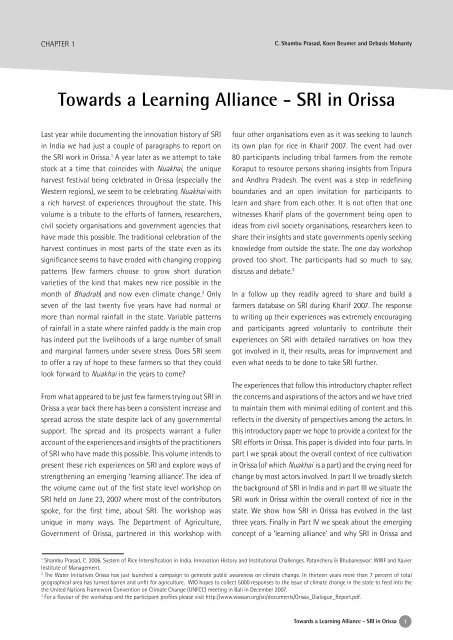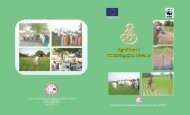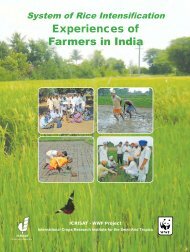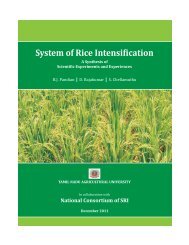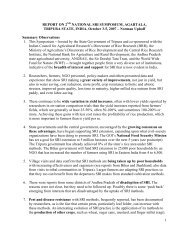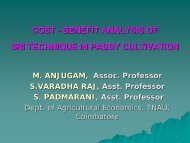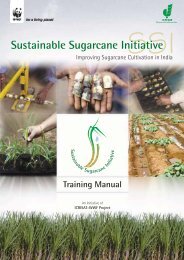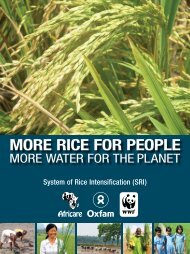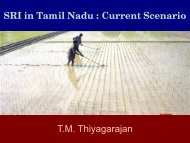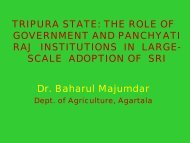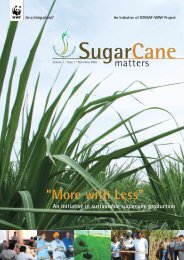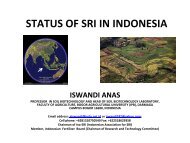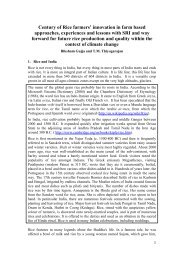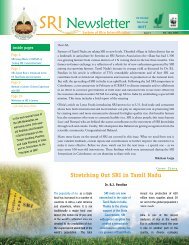SRI in Orissa - Cornell International Institute for Food, Agriculture ...
SRI in Orissa - Cornell International Institute for Food, Agriculture ...
SRI in Orissa - Cornell International Institute for Food, Agriculture ...
Create successful ePaper yourself
Turn your PDF publications into a flip-book with our unique Google optimized e-Paper software.
CHAPTER 1<br />
C. Shambu Prasad, Koen Beumer and Debasis Mohanty<br />
Towards a Learn<strong>in</strong>g Alliance - <strong>SRI</strong> <strong>in</strong> <strong>Orissa</strong><br />
Last year while document<strong>in</strong>g the <strong>in</strong>novation history of <strong>SRI</strong><br />
<strong>in</strong> India we had just a couple of paragraphs to report on<br />
the <strong>SRI</strong> work <strong>in</strong> <strong>Orissa</strong>. 1 A year later as we attempt to take<br />
stock at a time that co<strong>in</strong>cides with Nuakhai, the unique<br />
harvest festival be<strong>in</strong>g celebrated <strong>in</strong> <strong>Orissa</strong> (especially the<br />
Western regions), we seem to be celebrat<strong>in</strong>g Nuakhai with<br />
a rich harvest of experiences throughout the state. This<br />
volume is a tribute to the ef<strong>for</strong>ts of farmers, researchers,<br />
civil society organisations and government agencies that<br />
have made this possible. The traditional celebration of the<br />
harvest cont<strong>in</strong>ues <strong>in</strong> most parts of the state even as its<br />
significance seems to have eroded with chang<strong>in</strong>g cropp<strong>in</strong>g<br />
patterns (few farmers choose to grow short duration<br />
varieties of the k<strong>in</strong>d that makes new rice possible <strong>in</strong> the<br />
month of Bhadrab) and now even climate change. 2 Only<br />
seven of the last twenty five years have had normal or<br />
more than normal ra<strong>in</strong>fall <strong>in</strong> the state. Variable patterns<br />
of ra<strong>in</strong>fall <strong>in</strong> a state where ra<strong>in</strong>fed paddy is the ma<strong>in</strong> crop<br />
has <strong>in</strong>deed put the livelihoods of a large number of small<br />
and marg<strong>in</strong>al farmers under severe stress. Does <strong>SRI</strong> seem<br />
to offer a ray of hope to these farmers so that they could<br />
look <strong>for</strong>ward to Nuakhai <strong>in</strong> the years to come?<br />
From what appeared to be just few farmers try<strong>in</strong>g out <strong>SRI</strong> <strong>in</strong><br />
<strong>Orissa</strong> a year back there has been a consistent <strong>in</strong>crease and<br />
spread across the state despite lack of any governmental<br />
support. The spread and its prospects warrant a fuller<br />
account of the experiences and <strong>in</strong>sights of the practitioners<br />
of <strong>SRI</strong> who have made this possible. This volume <strong>in</strong>tends to<br />
present these rich experiences on <strong>SRI</strong> and explore ways of<br />
strengthen<strong>in</strong>g an emerg<strong>in</strong>g ‘learn<strong>in</strong>g alliance’. The idea of<br />
the volume came out of the first state level workshop on<br />
<strong>SRI</strong> held on June 23, 2007 where most of the contributors<br />
spoke, <strong>for</strong> the first time, about <strong>SRI</strong>. The workshop was<br />
unique <strong>in</strong> many ways. The Department of <strong>Agriculture</strong>,<br />
Government of <strong>Orissa</strong>, partnered <strong>in</strong> this workshop with<br />
four other organisations even as it was seek<strong>in</strong>g to launch<br />
its own plan <strong>for</strong> rice <strong>in</strong> Kharif 2007. The event had over<br />
80 participants <strong>in</strong>clud<strong>in</strong>g tribal farmers from the remote<br />
Koraput to resource persons shar<strong>in</strong>g <strong>in</strong>sights from Tripura<br />
and Andhra Pradesh. The event was a step <strong>in</strong> redef<strong>in</strong><strong>in</strong>g<br />
boundaries and an open <strong>in</strong>vitation <strong>for</strong> participants to<br />
learn and share from each other. It is not often that one<br />
witnesses Kharif plans of the government be<strong>in</strong>g open to<br />
ideas from civil society organisations, researchers keen to<br />
share their <strong>in</strong>sights and state governments openly seek<strong>in</strong>g<br />
knowledge from outside the state. The one day workshop<br />
proved too short. The participants had so much to say,<br />
discuss and debate. 3<br />
In a follow up they readily agreed to share and build a<br />
farmers database on <strong>SRI</strong> dur<strong>in</strong>g Kharif 2007. The response<br />
to writ<strong>in</strong>g up their experiences was extremely encourag<strong>in</strong>g<br />
and participants agreed voluntarily to contribute their<br />
experiences on <strong>SRI</strong> with detailed narratives on how they<br />
got <strong>in</strong>volved <strong>in</strong> it, their results, areas <strong>for</strong> improvement and<br />
even what needs to be done to take <strong>SRI</strong> further.<br />
The experiences that follow this <strong>in</strong>troductory chapter reflect<br />
the concerns and aspirations of the actors and we have tried<br />
to ma<strong>in</strong>ta<strong>in</strong> them with m<strong>in</strong>imal edit<strong>in</strong>g of content and this<br />
reflects <strong>in</strong> the diversity of perspectives among the actors. In<br />
this <strong>in</strong>troductory paper we hope to provide a context <strong>for</strong> the<br />
<strong>SRI</strong> ef<strong>for</strong>ts <strong>in</strong> <strong>Orissa</strong>. This paper is divided <strong>in</strong>to four parts. In<br />
part I we speak about the overall context of rice cultivation<br />
<strong>in</strong> <strong>Orissa</strong> (of which Nuakhai is a part) and the cry<strong>in</strong>g need <strong>for</strong><br />
change by most actors <strong>in</strong>volved. In part II we broadly sketch<br />
the background of <strong>SRI</strong> <strong>in</strong> India and <strong>in</strong> part III we situate the<br />
<strong>SRI</strong> work <strong>in</strong> <strong>Orissa</strong> with<strong>in</strong> the overall context of rice <strong>in</strong> the<br />
state. We show how <strong>SRI</strong> <strong>in</strong> <strong>Orissa</strong> has evolved <strong>in</strong> the last<br />
three years. F<strong>in</strong>ally <strong>in</strong> Part IV we speak about the emerg<strong>in</strong>g<br />
concept of a ‘learn<strong>in</strong>g alliance’ and why <strong>SRI</strong> <strong>in</strong> <strong>Orissa</strong> and<br />
1<br />
Shambu Prasad, C. 2006. System of Rice Intensification <strong>in</strong> India. Innovation History and Institutional Challenges. Patancheru & Bhubaneswar: WWF and Xavier<br />
<strong>Institute</strong> of Management.<br />
2<br />
The Water Initiatives <strong>Orissa</strong> has just launched a campaign to generate public awareness on climate change. In thirteen years more than 7 percent of total<br />
geographical area has turned barren and unfit <strong>for</strong> agriculture. WIO hopes to collect 5000 responses to the issue of climate change <strong>in</strong> the state to feed <strong>in</strong>to the<br />
the United Nations Framework Convention on Climate Change (UNFCC) meet<strong>in</strong>g <strong>in</strong> Bali <strong>in</strong> December 2007.<br />
3<br />
For a flavour of the workshop and the participant profiles please visit http://www.wassan.org/sri/documents/<strong>Orissa</strong>_Dialogue_Report.pdf.<br />
Towards a Learn<strong>in</strong>g Alliance - <strong>SRI</strong> <strong>in</strong> <strong>Orissa</strong> 1


